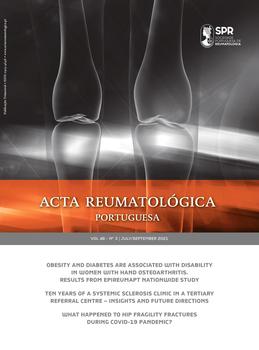Obesity and diabetes are associated with disability in women with hand osteoarthritis. Results from the EpiReumaPt nationwide study
Authors
Margarida Cruz; Ana Maria Rodrigues; Sara Dias; Alexandre Sepriano; Helena Canhão; Nélia Gouveia; Sofia Ramiro; Jaime C. Branco;
ABSTRACT
Background: Hand osteoarthritis (HOA) is a highly prevalent rheumatic disease that predominates in females and causes pain and loss of functional capacity. Obesity and metabolic syndrome have been previously suggested to associate with the severity of HOA, but clarity on these associations is yet to be achieved. Objective: Test the association between obesity and other components of the metabolic syndrome and disability in women with hand osteoarthritis (HOA). Design: Individuals from EpiReumaPt epidemiological community-based study (2011-2013) are representative of the Portuguese population. Women with diagnosis of primary HOA were included. Primary outcome: hand functional status, assessed by Cochin questionnaire. Secondary outcomes: hand pain, assessed by visual analogue scale and tender hand joint count (THJ). Explanatory variables: obesity, diabetes mellitus, arterial hypertension and hypercholesterolemia. Possible associations between obesity and the other components of metabolic syndrome with Cochin score, hand pain and THJ were tested in a multivariable linear regression model. Potential confounders considered: age, education level and countrywide distribution. Results: 473 women with primary HOA were included. Forty percent were overweight and 29% obese. Ninety-three (19.8%) participants had diabetes, 261 (55.8%) reported hypertension and 261 (55.9%) hypercholesterolemia. Mean Cochin score was 15.5±14.8, mean pain VAS was 4.7±2.6 and mean THJ 1.4±3. In the multivariable analysis, obesity (β 4.6 CI 0.7;8.5) and diabetes (β 4.0 CI 0.4;7.6) were found to significantly associate with HOA functional disability. In addition, diabetes, but not obesity, associated with hand pain. There was no association between obesity or diabetes with THJ. Conclusion: In a Portuguese female population with primary HOA, obesity and diabetes mellitus independently associated with a worse hand functional status. These data add to evidence suggesting a role of metabolic factors in the severity of HOA.
Margarida Cruz
NOVA Medical School; Reumatologia, Faculdade de Ciências Médicas de Lisboa; Hospital CUF Descobertas, Lisboa
Ana Maria Rodrigues
EpiDoc Unit, CEDOC; Comprehensive Health Research Centre/ NOVA Medical School, Lisboa
Sara Dias
EpiDoc Unit, CEDOC; Comprehensive Health Research Centre/ NOVA Medical School, Lisboa
Alexandre Sepriano
NOVA Medical School, Rheumatology; Leiden University Medical Centre, Leiden, Netherlands
Helena Canhão
EpiDoc Unit, CEDOC; Comprehensive Health Research Centre; Reumatologia, NOVA Medical School, Lisboa; CHULC, Hospital Curry Cabral, Lisboa
Nélia Gouveia
NOVA Clinical Research Unit, NOVA Medical School, Lisboa
Sofia Ramiro
Rheumatology, Leiden University Medical Centre, Leiden, Netherlands; Rheumatology, Zuyderland Medical Centre, Heerlen, Netherlands; NOVA Medical School, Lisboa
Jaime C. Branco
EpiDoc Unit, CEDOC; Comprehensive Health Research Centre; Reumatologia/ NOVA Medical School, Lisboa; CHLO, Hospital Egas Moniz, Lisboa
NOVA Medical School; Reumatologia, Faculdade de Ciências Médicas de Lisboa; Hospital CUF Descobertas, Lisboa
Ana Maria Rodrigues
EpiDoc Unit, CEDOC; Comprehensive Health Research Centre/ NOVA Medical School, Lisboa
Sara Dias
EpiDoc Unit, CEDOC; Comprehensive Health Research Centre/ NOVA Medical School, Lisboa
Alexandre Sepriano
NOVA Medical School, Rheumatology; Leiden University Medical Centre, Leiden, Netherlands
Helena Canhão
EpiDoc Unit, CEDOC; Comprehensive Health Research Centre; Reumatologia, NOVA Medical School, Lisboa; CHULC, Hospital Curry Cabral, Lisboa
Nélia Gouveia
NOVA Clinical Research Unit, NOVA Medical School, Lisboa
Sofia Ramiro
Rheumatology, Leiden University Medical Centre, Leiden, Netherlands; Rheumatology, Zuyderland Medical Centre, Heerlen, Netherlands; NOVA Medical School, Lisboa
Jaime C. Branco
EpiDoc Unit, CEDOC; Comprehensive Health Research Centre; Reumatologia/ NOVA Medical School, Lisboa; CHLO, Hospital Egas Moniz, Lisboa





